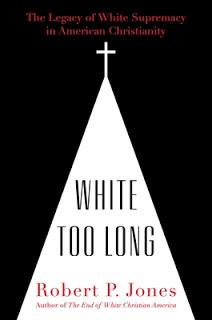
No matter how distracted and enervated I may be at present as we cope with some health issues, I can't let today pass by without noting that a very important book is appearing in print today. This is Robert P. Jones's White Too Long: The Legacy of White Supremacy in American Christianity.
Robert P. Jones is the founder and CEO of Public Religion Research Institute. I blogged several times about his previous book The End of White Christian America in 2016, when it was published (see here, here, and here). The Atlantic is featuring today, as White Too Long is published, a statement by Jones entitled "White Christian America Needs a Moral Awakening."
Here's the opening portion of that essay:
The Christian denomination in which I grew up was founded on the proposition that slavery could flourish alongside the gospel of Jesus Christ. Its founders believed that this arrangement was not just possible, but divinely mandated. Yet many white Christians, like myself, came of age in churches and communities where we seldom heard anything substantive or serious about the white-supremacist roots of our faith.
I was raised in a Southern Baptist family, participated actively in my Southern Baptist church, and graduated from Mississippi College, a Southern Baptist institution. But it wasn't until I was a 20-year-old seminary student that I began to grasp the central role that my denomination, and white Christians generally, have played in sustaining and legitimizing white supremacy. I knew that there had been a split between Northern and Southern Baptists, but the narrative was vague. Baptists in the South, I was taught, were caught in larger cultural and political fights that were rending the country in the mid-1800s. And—just as I had learned from my Mississippi public-school education—the true causes of the Civil War were 'complicated.' Slavery was not the central issue but merely one of many North-South conflicts precipitating the split. As the prominent Baptist historian Walter "Buddy" Shurden has pointed out, it wasn’t until the last quarter of the 20th century that white Baptist historians confronted the denomination’s pro-slavery, white-supremacist origins.
The Baptist denominational history is not unique in American Christianity. Virtually all of the major white mainline Protestant denominations split over the issue of slavery. For example, Northern and Southern Methodists parted ways in 1845, the same year as the Baptists, producing an additional spark for the tinderbox of Southern political secession. While they disagreed about slavery, both Southern and Northern Methodists agreed that Black Methodists should hold a subservient place not just in society but also in Christian fellowship. When the branches reunited in 1939, they segregated Black congregations into a deceptively named 'Central Jurisdiction,' thereby limiting their influence in the denomination for three decades, until this system was finally abolished in 1968. And while the national United Methodist Church publicly supported the civil-rights movement, most white Methodists in the pews rejected or simply ignored national denominational directives and actions. In the South, white Methodists and other mainline Protestants were hardly distinguishable from white Baptists in their support of a white-supremacist social order during the civil-rights era.
The history of white supremacy among white Catholics is more complex, but the connection to white supremacy is equally clear. With its roots in Western Europe, Roman Catholicism has a long history of colonialism, particularly in Africa and the global South, where centuries of atrocities against Black and brown peoples were justified by the conviction that white Christians were God’s chosen means of 'civilizing' the world. In the United States, Catholics and Catholic institutions were prominent slaveholders in the 18th and 19th centuries and forced enslaved people to convert to the religion. In late-18th-century Maryland, for example, one-fifth of Catholics were enslaved people owned by white Catholics or white Catholic institutions.
Given this pervasive history, it is well past time for white Christians to reckon with the racism of our past and the willful amnesia of our present. For most white Christians, this journey will be challenging because, as I have found, it is deeply personal. My 1815 family Bible gives witness to ancestors from middle Georgia who were Baptist preachers, slave owners, and Confederate soldiers. My family moved from Virginia to Georgia after receiving land grants as a reward for military service in the Revolutionary War. This occurred while the government was forcibly removing Native Americans from Georgia and supporting the growth of white settlements.
Underneath the glossy, self-congratulatory histories that white Christian churches have written about themselves—which typically depict white Christians as exemplars of democratic principles and pillars of the community—is a thinly veiled, deeply troubling past. White Christian churches have not just been complacent or complicit in failing to address racism; rather, as the dominant cultural power in the U.S., they have been responsible for constructing and sustaining a project to protect white supremacy. Through the entire American story, white Christianity has served as the central source of moral legitimacy for a society explicitly built to value the lives of white people over Black people. And this legacy remains present and measurable in the cultural DNA of contemporary white Christianity, not only among evangelicals in the South but also among mainline Protestants in the Midwest and Catholics in the Northeast.
I have not yet read White Too Long, but I certainly intend to do so very soon. From all I know about the book already, I have concluded it is a very important book, a must-read one — and I hope readers of the preceding excerpt from The Atlantic's current essay summarizing the book's themes will consider reading it.

